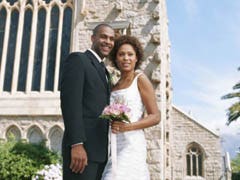6 Things You Should Know About Black Marriage
March 27 is Black Marriage Day. But what's race got to do with it?

March 27 is Black Marriage Day. If you're wondering why you haven't heard of Hispanic Marriage Day or Asian Marriage Day or Native American Marriage Day—you get my drift—it's because they don't exist.
Sure, there's National Marriage Week each year from February 7 to February 14, but why is there a day specifically devoted to celebrating black matrimony? Because statistics show that black couples are not only less likely to get married than other races; they're also more likely to get divorced. /node/65708
Nisa Muhammad, founder of the Wedded Bliss Foundation, created Black Marriage Day in 2002 to raise awareness that marriage strengthens black families and the community as a whole.
"Black people have the lowest marriage rates in the country," Muhammad says. "Too many of our children are denied the gift of a two-parent family. Black men make more money and can bring women and children out of poverty, and marriage is the safest place for women and children, in terms of domestic violence and abuse. Communities with strong marriages have better schools, higher property values and lower crime. The recidivism rate for black men drops significantly when they get married, too. Marriage and crime don't seem to mix."
Do you agree that there should be a specific movement aimed at getting black men and women to marry? Consider these six statistics from 2005-2009 U.S. Census data:
1. Black men and women are less likely to get married. Half of black men and women in their early thirties had never married, compared to less than a third of people in other racial groups.
2. Black women are less likely to get married than any other segment of the population—including black men. Black women ages 35 to 44 are the only American women in their child-bearing years with lower marriage rates than men of the same race or ethnicity. (For every five black men who married in 2008, one married a non-black woman.) Thirty-one percent of black women in their early forties have never been married, yet the same holds true for only nine percent of white, 11 percent of Asian and 12 percent of Hispanic women.
3. Black couples are more likely to get divorced. Among black men and women ages 15 and up, almost half (47 percent) have never been married, 12 percent are divorced and five percent are separated. Those last two numbers don't look that high on their own, but compared to divorce rates among other racial groups, they are: only five percent of Asians, 8 percent of Hispanics and 11 percent of white men and women ages 15 and up are divorced.
4. Most black children are born out of wedlock. In 2008, almost three-quarters (72 percent) of black children were born to unwed mothers. In the same year the rate was 17 percent of Asian, 29 percent of white and 53 percent of Hispanic children.
5. Black children are more likely to grow up in a single-parent household. Nearly 48 percent of black kids live with a singleton: a third live with an unmarried woman, and 15 percent live with an unmarried man. The number appears to climb as children get older—55 percent of black teens ages 15 to 19 live in a household headed by a single woman; 8 percent live with a single man.
6. Single mothers struggle. Thirty-six percent of black families led by single women live below the poverty level, compared to seven percent of black married-couple households. (For whatever reason, there is no data on poverty among families head by single black men.)
There's no doubt that there are strong single-parent families out there. It's not always better to be married, either—staying in an abusive or unhappy relationship "for the kids" does more harm than good. But these numbers do indicate a decline in marriage, coupled with a steady desire and decision to have children. I Knocked Myself Up: What It's Like To Have A Solo Pregnancy
Many people have tried to explain the dearth of black marriages by examining men and women's differing values, the expense of marriage, and incarceration rates. Some blame the celebration of pimps and players, which might make black men devalue monogamy and black women not expect it. Some have even called marriage a white institution.
Nisa Muhammad, founder of Black Marriage Day, doesn't care about placing blame. She just wants to change things through her work with Wedded Bliss Foundation, where she provides relationship counseling and classes for teens, singles and couples. "I want to create cultural change where marriage becomes the norm in the black community rather than the exception," Muhammad says. "This may take generations to accomplish, but every Black Marriage Day is another year closer to the goal."
What do you think? Would an increase in black marriages benefit the black community and society at large?

